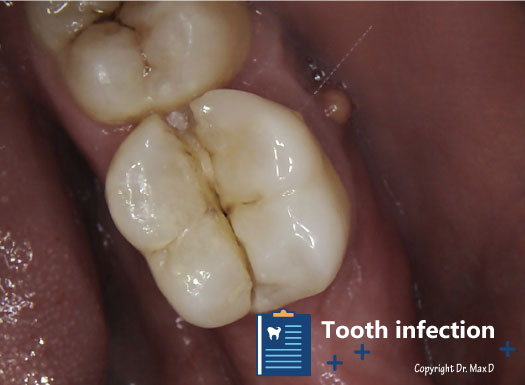Teeth infection
A tooth abscess is essentially a dental distress signal, indicating a battle between your body and invading bacteria. Occurring at the root of the tooth or in the surrounding gums, an abscess is a collection of pus that forms due to a bacterial infection. Whether it’s a periapical abscess at the tooth’s tip or a periodontal abscess nestled in the gums, the underlying cause often traces back to untreated cavities, previous dental work, or injury.
At Thorncrest Dental, our Etobicoke dentists emphasize the importance of recognizing the signs early to prevent the spread of infection and more serious complications.
Causes of tooth infection
Sensitive teeth can stem from a variety of issues, including tooth decay, worn enamel, exposed tooth roots, receding gums, and aggressive brushing habits. Our dental office in Etobicoke is well-versed in identifying these culprits and crafting personalized treatment plans to shield your teeth from sensitivity’s icy grip.

Symptoms of cracked teeth
Symptoms of an infected tooth can vary in intensity but often include severe, throbbing pain that may radiate to the jaw, neck, or ear, disrupting daily activities and sleep. Temperature sensitivity, especially to hot and cold stimuli, can exacerbate discomfort, causing sharp or shooting pains. Pain when chewing or biting is common, indicating inflammation or infection within the tooth. Swelling and redness in the face or gums may accompany the pain, signaling an inflammatory response to the infection. Additionally, individuals may experience unpleasant tastes or odors in the mouth and, in some cases, develop a fever as the body fights the infection. These symptoms collectively indicate the need for prompt dental evaluation and treatment to address the underlying infection and alleviate discomfort.

Cracked tooth resulted in dental infection.
Treatment Options for tooth infection
Treating a tooth abscess involves a combination of draining the infection and addressing the root cause to prevent recurrence. Our team at Thorncrest Dental is skilled in providing comprehensive care tailored to each patient’s needs.
Procedure Details: How to treat tooth infection
At Thorncrest Dental, the journey to alleviating tooth sensitivity is paved with personalized care. Our approach begins with a thorough evaluation to identify the root cause of your sensitivity. Here’s what to expect:
- Initial Consultation: A detailed discussion about your symptoms, dietary habits, and oral hygiene practices.
- Comprehensive Examination: Utilizing x-rays and potentially CT scans, we assess the extent of the infection and plan the appropriate treatment.
- Treatment Planning: Based on the diagnosis, we’ll propose a tailored treatment plan. This may include one or more of the following:
- Immediate Relief and Diagnosis: Drainage: The first step involves making a small incision to drain the abscess, providing immediate pain relief.
- For many patients, a root canal therapy offers a way to save the tooth by removing the infected pulp, cleaning the inner chambers, and sealing them to prevent future infections. This procedure, followed by the placement of a crown, can restore the tooth’s functionality and appearance.
- In cases where the tooth cannot be salvaged, extraction may be necessary to remove the source of infection. Following extraction, we discuss replacement options, such as dental implants or bridges, to restore your smile’s integrity.
- While not always needed, antibiotics are prescribed if the infection has spread beyond the tooth or in patients with weakened immune systems.
Each procedure is performed with the utmost care, ensuring your comfort and addressing the specific needs of your hypersensitive teeth.
Recovery and prevention of tooth infection
Post-treatment care is vital for healing and preventing future dental issues. At Thorncrest Dental, we provide personalized aftercare instructions, emphasizing the importance of oral hygiene and regular check-ups. Recovery may involve:
- Maintaining oral hygiene with gentle cleaning around the affected area
- Avoiding certain foods that could irritate the site
- Attending follow-up appointments to monitor healing
Our team is always here to support you through your recovery, offering tips and advice to keep your smile bright.


Why choose Thorncrest Dental for tooth infection in Etobicoke
Choosing Thorncrest Dental for your dental care, especially when dealing with something as serious as a tooth abscess, means putting your trust in a team that values your health and comfort.
Our expertise in treating dental abscesses, combined with our commitment to patient education and preventive care, sets us apart.
We ensure that our patients not only receive the immediate care they need but also understand how to maintain their dental health in the future.
Frequently asked questions about infected teeth
Q1: Can tooth infections go away on their own?
A: No, tooth infection requires professional dental treatment to eliminate the infection and prevent further health complications. Ignoring an abscess can lead to serious, potentially life-threatening conditions.
Q2: What can I do to prevent tooth infection?
A: Prevention is key to avoiding tooth infections. Regular dental check-ups, proper oral hygiene practices including brushing twice a day and flossing daily, and reducing sugary food and drink intake are crucial steps. Additionally, wearing a mouthguard during sports can prevent injuries that may lead to abscesses.
Q3: How quickly should I see a dentist if I suspect tooth infection?
A: Immediate consultation with a dentist is recommended if you suspect you have a tooth infection, especially if you experience severe pain, fever, or swelling. Early treatment can prevent the infection from spreading and preserve the tooth.
Q4: Is root canal therapy painful?
A: Modern root canal treatments are performed with effective anesthesia, making the procedure very tolerable as possible. At Thorncrest Dental, we ensure our patients’ comfort and address any anxieties they may have about treatment.
Q5: What are the signs that the infection has spread?
A: Signs that an abscess/infection may have spread include fever, swelling in the face or neck, difficulty breathing or swallowing, and increased pain. If you experience these symptoms, seek immediate medical attention.
